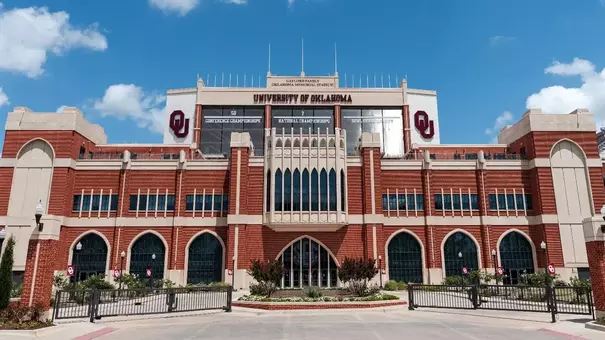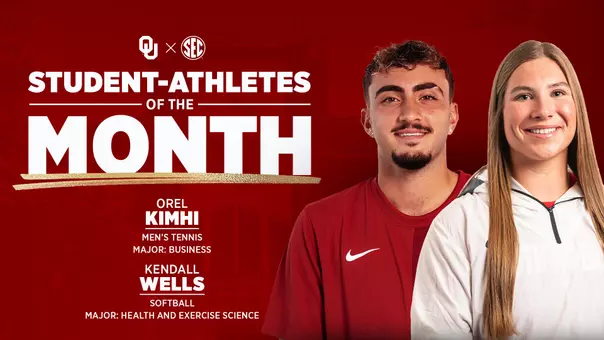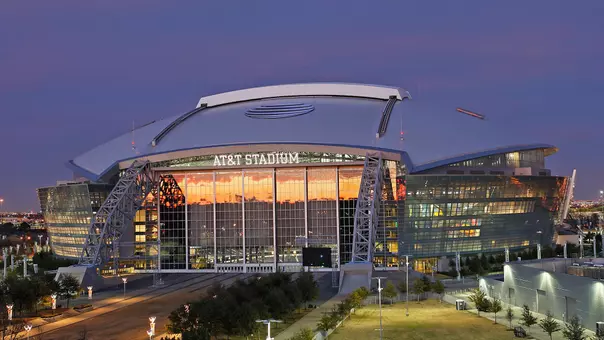University of Oklahoma Athletics
Black History Month: Thomas Lott
February 16, 2022 | Football, Athletics
From the moment he stepped onto the University of Oklahoma campus in August of 1975, freshman quarterback Thomas Lott was eager to show off his football parenting skills.
"That offense was my baby," Lott said. "That was my baby, until I had my oldest son. I wanted the whole world to see how beautiful my baby was. I was like a proud mama. That's how I looked at it."
But as it turned out, Lott was going to have to wait for his opportunity. That's because the OU quarterback depth chart was 10 names deep, and his was near the bottom.
"I'm kind of looking up the depth chart list for my name. Instead, I have to go down to the number eight – and there were two more names below mine," Lott said, forcing a chuckle. "I'm way down there. I'm like, 'Did they forget who I am? I'm the guy you all had the red carpet out for (during recruiting). It's Thomas. It's me. I'm here now.' I was a little bit mad because I had to do the scout team quite a bit, which meant I wasn't learning what I needed to learn. The reason I came there was to run the wishbone and learn how to do that. We all got along, though. There were no hard feelings."
Undeterred, Lott made it a point to scout his competition. He scoured game and practice film of his fellow quarterbacks. He wanted to know who and what he was up against.
One of the nation's premier prep option quarterbacks, Lott didn't even play the position until his junior season at John Jay High School in San Antonio when he was asked to fill in for injured teammates. Lott previously had been a running back and all-conference cornerback.
As a recruit, Lott seriously considered playing at Texas A&M, which was looking at him to potentially start as a freshman. Meanwhile, the Sooners were fresh off winning the 1974 national championship while going a combined 43-2-1 from 1971-74.
"I thought we had him all along," OU head coach Barry Switzer said of Lott. "He was an option quarterback. That's what he wanted to do and he knew we would play him at quarterback. A lot of people who recruit a Black quarterback play him at defensive back or receiver."
What set Lott apart? "His athleticism, his ability, his speed, his quickness," Switzer said. "In high school, they called him 'Black Magic.' He was fast as hell. He was a 4.5 guy (in the 40-yard dash). He threw the ball well enough, but that wasn't the first criteria. He fit us well."
The already loaded Sooners, who had never had a Black starter at quarterback, reloaded when Lott joined arguably Switzer's best-ever recruiting class, which is saying something given OU had at least one All-American for 18 straight seasons (1971-88). The 1975 recruiting haul also included 1978 Heisman Trophy winner Billy Sims, 1978 Outland Trophy winner Greg Roberts, George Cumby, Reggie Kinlaw and Daryl Hunt – all of whom became two-time, first-team All-Americans – plus Kenny King, Reggie Mathis, Victor Hicks and others. "We signed 13 of the top 19 players on the Blue Chip list in Texas that year," Switzer said.
"Honestly, we didn't know how great that class was at the time," Lott said. "I had run into Greg Roberts a couple of times on recruiting trips. I had run into George Cumby. That's when we decided, 'Hey, let's come to OU and be roommates.' As far as Billy, Kenny and those guys, the only way we could kind of keep up with each other was through the Texas Dave Campbell Magazine. There was no way to get to know each other. There were no cell phones. We didn't have any idea that we were going to all end up at OU like we did. You talk about a special, special class. I have been so honored to be a part of that class."

OU's first Black quarterback was Kerry Jackson, who arrived in 1972, the same year the NCAA made freshmen eligible for the first time in 20 years.
The late Steve Davis, who was white, was quarterback of Switzer's first three OU teams, which went 32-1-1 (.956) and claimed national championships in 1974 and 1975. However, most everyone agreed Jackson was the far more athletic quarterback.
"Kerry Jackson was going to be our quarterback," Switzer has said. "Steve Davis would never have been the quarterback if Kerry had been eligible. Kerry was really a good talent. He was going to be a great player. Kerry's something special."
Jackson's quest to become OU's first Black starting quarterback officially was derailed with an announcement on April 18, 1973. Unbeknownst to Jackson, administrators at Galveston Ball High School in Texas had changed his academic transcripts, making it possible for him to qualify for admittance into OU. As punishment, the Sooners were placed on NCAA probation for two seasons (no bowls or television). Jackson was declared ineligible for the 1973 season.
Not long after the NCAA's announcement, Jackson suffered a broken sternum in a car crash and spent a week in intensive care. By the time Jackson regained his eligibility and returned from his injuries, Davis had still yet to suffer his first loss as the starting quarterback and the Sooners went on to win back-to-back national titles. "I'll tell you what, Steve Davis is lucky Kerry got hurt," Switzer said. "He'd have beaten him out."
By Jackson's senior season of 1975, three younger quarterbacks had passed him on the depth chart – Dean Blevins, Joe McReynolds and Lott.
"Let's don't fool ourselves into believing this country didn't look at Black people differently, because they did. There's absolutely no question they did."
Thomas Lott
Lott's first start at OU wouldn't come until the fifth game of his sophomore year on Oct. 9, 1976, against Texas, which ended in a 6-6 tie. The starting job came with some heavy baggage.
In the 1960s and '70s, the color barrier finally had been breached among major college football programs in the South. Running back Prentice Gautt broke the OU color barrier in 1957 as the school's first Black scholarship player. When Lott became the Sooners' first Black starting quarterback 20 seasons later, an extreme bias permeated the position.
"There was this attitude Black people weren't smart enough to play quarterback," Lott said. "On one of my (recruiting) trips (to another school), Black players there came to me – there were probably about six or seven of them – and they told me, 'Thomas, you know you're not going to play here. They're not ready to play a Black quarterback here.' For me, it was like, 'I don't really want to deal with that. I'm going to have to deal with going to college. Am I college material? I don't know. I've got to deal with learning the system. I don't want to have to be fighting people about the color of my skin.' So that's something I did not want to put myself in a situation to deal with that, knowing it's out there. I was trying my best not to go somewhere where it was obvious that I was going to have to deal with that."
This all jibed with Switzer's coaching philosophy. "We just recruited the best players at all positions before anyone else was," Switzer said. "We were doing the right thing when no one else was doing the right thing. Didn't make a difference who they were and that's why we were so successful (recruiting) in Texas during that time. They weren't doing it and we were."
Having a head coach with that approach helped OU strengthen its stature among college football's elite programs a half-century ago. Switzer said the OU administration knew who they were getting when they promptly elevated him to head coach in January 1973 after Chuck Fairbanks left to coach the NFL New England Patriots.
"Nobody in administration ever said anything to us," Switzer said of recruiting Black players. "You might have had some old '49ers back from that era write some letters and say a few things, but they didn't mean (bleep) to us. We laughed at that stuff."
Were there obstacles? "Well, not when I got to OU," Lott said, "but there were obstacles out there. I understand where coach Switzer's coming from (with his recruiting philosophy). There's no question about that. But let's don't fool ourselves into believing this country didn't look at Black people differently, because they did. There's absolutely no question they did. I heard it from different people. Not to my face, but in different situations and different articles of things that were said. I do explain to people that when I went to the University of Oklahoma at that time, there was a lot of unrest in the country."
The fact Switzer had to defend his open-minded recruiting approach proves bias did exist.
"I know coach Switzer ran into situations with those things being said," Lott said. "I mean he had to verify that, but once they decided to make him head coach, he said, 'I'm going to go out and recruit the best players out there. I don't care where they come from. I don't care who they are.' Why would he need to say that if there wasn't something in the air that needed to be clarified if they were going to make him their head coach? We all know what that means.
"I think when I got to OU, there were only about five Black starting quarterbacks out of every major college in the United States. It was the position. It wasn't the type of offense you had. There's no question about that. It was the position that was trying to be saved for just only certain people smart enough to play that position. It wasn't that we couldn't play the position, but something was stopping us from being in that position. By the time I left OU, it (the stereotype) was starting to kind of melt away. The proof that it wasn't true was starting to become obvious."
As for other members of the OU roster, Lott said he had limited exposure to future teammates during his recruiting trip.
"During my visit, I didn't really mingle with the players," Lott said. "There was only two I really dealt with. Lee Roy (Selmon) picked me up from the airport and we talked, and (Elvis) Peacock called me and asked me if I wanted to go hang out and we talked a little bit. He (Peacock) ended up bringing me something to eat because I didn't want to go anywhere. Those were the only two people I saw, so I didn't really get a chance to visit with the players at OU and see how they felt about where they were in their situation."
When he returned to OU as a student-athlete, Lott said he chuckled at what he saw.
"We were so minority deep, it wasn't even funny," Lott said. "I tell people when I got to the University of Oklahoma that August just before we had three-a-days, I thought I must have made a wrong turn and ended up in Louisiana somewhere at one of our Historically Black Universities (and Colleges). You know what I'm saying? Hey, is this Langston? I'm not going to lie to you. There were plenty of us representing when I got there.
"I came to OU with one thing on my mind and that was to see if I was going to get the opportunity to play or not. That was my whole thing when I came here. That Black/white stuff had come up during other recruiting trips. But when I got to OU, I was strictly ready for business. I was like, 'All right, I'm done playing around.' I decided, 'I'm going to go to a wishbone school because if they leave me at quarterback, fine. If they move me to running back, fine. If they move me to corner(back), fine. I wasn't sold on playing quarterback. I just wanted to play football.'"
Lott said he doesn't recall any heart-to-heart chats with Jackson about becoming the first Black starting quarterback in OU history. "We became friends because we were in drills together every day," Lott said. "We were there together."
Lott maintains many racial misperceptions remain today.
"There's things that people just don't know," said Lott, who resides in Oklahoma City. "That's why I still try to thank the people who supported us and to kind of straighten some things out. Let people know some things they didn't know. There's always things going on behind the scenes that you don't know, situations that people go through. Sometimes you can't put your finger on a certain situation. It takes time to figure things out."
Some even were offended by Lott's signature move of wearing a bandana on his head to help protect his Afro from helmet indentations. Lott once asked Switzer if he should ditch wearing the bandana.
"Thomas, you've been wearing it ever since high school," Switzer told Lott. "I know why you're wearing it. So you wouldn't have to stand around with that pick (comb) for 20 minutes. That's why you're playing quarterback. You're smarter than the rest of them."
Hunt said Lott was a folk hero, even among the players. "When Thomas broke out his bandana, I broke out mine," Hunt said.
"There are only a few of us who get the best college football has to offer, and I was blessed to be one of those people. I'm going to always be thankful for it."
Thomas Lott
After Jackson and Lott broke the color barrier, OU continued to excel with a steady stream of Black starting quarterbacks in J.C. Watts, Darrell Shepard, Danny Bradley and Jamelle Holieway, who in 1985 became the first true freshman quarterback (of any color) to lead his team to the national championship. In 2018, Kyler Murray won the Heisman Trophy and in 2019 Jalen Hurts was the award's runner up.
Switzer doesn't claim to know what his Black quarterbacks endured. Watts would show him hate letters, but Lott did not. "Thomas handled it differently," Switzer said.
When Lott finally got his opportunity to start at OU, he pounced. "You better be prepared to take advantage of your opportunity," Lott said. "When it does come, you better be ready to open the door when you hear that knock because you might not get it again."
Lott led the Sooners to a 23-5-1 record in his 29 games as OU's starter from 1976-78, and to three Big Eight championships. Over the 1977 and '78 seasons, OU was ranked no lower than seventh in the AP poll and spent nine weeks at No. 1. It beat Wyoming 41-7 in the 1976 Liberty Bowl and downed Nebraska 31-24 in the Orange Bowl to conclude the 1978 campaign, avenging the team's only loss (17-14 in Lincoln) that season.
A first-team All-Big Eight selection as a junior and senior, Lott finished his collegiate career as OU's rushing leader among quarterbacks, and currently ranks second behind Holieway. He rushed for 2,146 yards and touchdowns, and ran for at least 100 yards in eight games, including 195 vs. Kansas State in 1976, which still stands as the OU record for a quarterback. He went on to play the 1979 season with the St. Louis Cardinals as a running back and spot return man before joining the USFL's New Jersey Generals for the 1983 season. He was the Generals' primary punt and kick returner.
Since he departed OU, a strong argument can be made no one ran the triple-option better.
"I guarantee you, as far as reading the true triple-option, I will say there's nobody in this country that could run the option better than me. Nobody," Lott said with conviction. "There might have been a few players here and there – and I'm not talking color or race; I don't care where you came from – there might have been a couple guys who could do it as well as I did, but nobody better than me. And the reason I say that is because I knew nobody loved it more than I did.
"I tell people all the time, I couldn't have gone to any university anywhere and had an opportunity to accomplish what I did, and to do it with the people I had the opportunity to be around and love to this day. It couldn't have been any better for me. I got the best college football had to offer. There's only a few of us out there that get that. I don't care what position you play. I don't care what university you go to. There are only a few of us who get the best college football has to offer, and I was blessed to be one of those people. I'm going to always be thankful for it."













